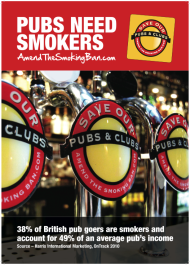The bully state in action
 Wednesday, December 2, 2009
Wednesday, December 2, 2009 Earlier today I gave a short interview to BBC Radio London in response to a new initiative by the City of London Corporation to crack down on cigarette litter. Full story HERE.
As ever I made the point that while Forest doesn't condone littering, we don't understand why smokers should be singled out for fines and possible prosecution. Litter comes in many forms and includes chewing gum, sweet wrappers, newspapers, promotional literature etc etc.
If local authorities really want to reduce cigarette litter they ought to lobby government to amend the smoking ban to allow people to smoke indoors in designated rooms.
Anyway, I was walking back to my office in Soho (where smokers seems to outnumber non-smokers) when I passed a pub that had a number of cigarette bins on the wall.
Closer inspection revealed them to be property of Adbins, "a new unique and innovative product designed to benefit business owners throughout the UK since the introduction of the smoking ban".
Apparently there are 14,000 Adbins across 6,500 locations in Greater London and the number is growing daily (but not in the City of London, I'd hazard a guess).
It's a good idea but the problem is this: a lot of local authorities are reluctant to give planning permission for cigarette bins (nor will they pay for them to be erected on lamp posts or elsewhere) because they fear cigarette bins would "normalise" smoking - and we all know that it is official government policy to denormalise smoking.
Instead, they prefer to hire a small army of "street environment officers" with a view to fining smokers and prosecuting local businesses.
A prime example, I think you will agree, of the bully state in action.
 Bully State
Bully State 









